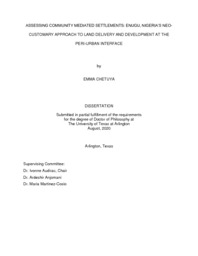
ATTENTION: The works hosted here are being migrated to a new repository that will consolidate resources, improve discoverability, and better show UTA's research impact on the global community. We will update authors as the migration progresses. Please see MavMatrix for more information.
Show simple item record
| dc.contributor.advisor | Audirac, Ivonne | |
| dc.creator | Chetuya, Emma | |
| dc.date.accessioned | 2022-01-20T18:09:40Z | |
| dc.date.available | 2022-01-20T18:09:40Z | |
| dc.date.created | 2020-08 | |
| dc.date.issued | 2020-09-03 | |
| dc.date.submitted | August 2020 | |
| dc.identifier.uri | http://hdl.handle.net/10106/30175 | |
| dc.description.abstract | Like most states in Nigeria, the Enugu state government is unable to meet the high demand of land for housing development in Enugu and as a result, the vast majority of land available for purchase is through customary sources. Rapid urbanization is expanding and the urban population is seeking relatively affordable land for development. This is happening predominantly in the peri-urban areas of Enugu. It is in this area where community-mediated settlements (CMS) are developing. CMSs are joint ventures between local communities and the government that provide subdivided land for development. These initiatives are neo-customary in nature as they have aspects of customary, informal, and formal methods of land sales and subdivision amalgamated in their practices. For the most part, CMSs are primarily characterized by a lack of basic infrastructure and services and long delays in development. Considering that most of the population in search for subdivided land depends on the CMS process of peri-urban development, this dissertation gains an insight into neo-customary land delivery systems for residential development in peri-urban Enugu City to discover opportunities for improvement of these systems.
The Institutional Analysis and Development Framework (IAD) is used to capture and frame the CMS process and suggest how this system of land delivery and development can enhance the benefits of the creation, delivery, and execution of these settlements and mitigate their weaknesses. A case study of two CMS communities in east Enugu’s periphery was conducted to achieve a contextual comprehension of the institution of CMSs by means of semi-structured and unstructured interviews and archival review of documents and this was achieved by means of examination of the essential roles of actors in the CMS process. The research revealed numerous themes that are consistent with the existing literature. The study revealed that there is a level of embeddedness or institutionalization with existing Enugu (post-colonial) public planning functions and structure. These two systems are merging into a kind of practical “syncretism” between the two planning cultures. Nonetheless, the study further revealed how communities are pre-emptively engaging in land development practices in order to avoid the undercompensated expropriation of community land by the state government. The study revealed not only opportunities for mixing residential and agricultural land uses in order to benefit community mediated settlements, but also the relatively excessive expectations put on the government to extend infrastructure to the urban periphery while CMSs must make do with self-help and alternative measures of infrastructure provision. | |
| dc.format.mimetype | application/pdf | |
| dc.language.iso | en_US | |
| dc.subject | Community-mediated settlements | |
| dc.subject | Alternative land delivery and development | |
| dc.subject | Post-colonial | |
| dc.subject | Nigeria | |
| dc.title | Assessing Community Mediated Settlements: Enugu, Nigeria's Neo-Customary Approach to Land Delivery and Development at the Peri-Urban Interface | |
| dc.type | Thesis | |
| dc.degree.department | Urban and Public Affairs | |
| dc.degree.name | Doctor of Philosophy in Urban Planning and Public Policy | |
| dc.date.updated | 2022-01-20T18:09:41Z | |
| thesis.degree.department | Urban and Public Affairs | |
| thesis.degree.grantor | The University of Texas at Arlington | |
| thesis.degree.level | Doctoral | |
| thesis.degree.name | Doctor of Philosophy in Urban Planning and Public Policy | |
| dc.type.material | text | |
Files in this item
- Name:
- CHETUYA-DISSERTATION-2020.pdf
- Size:
- 1.609Mb
- Format:
- PDF
This item appears in the following Collection(s)
Show simple item record


